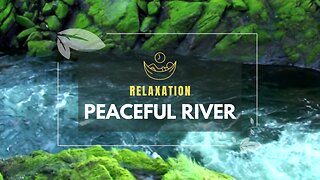Relaxing music with river sound, meditation music
Your bedroom environment should promote restful sleep. Outside noises can easily startle people awake and make it difficult to fall back asleep. But for many sleepers, a completely quiet bedroom can be hard to come by.
Even when it doesn't fully wake you up, environmental noise at night (1) can trigger your stress response, increase your heart rate, and affect your sleep quality. Nighttime noise may leave you feeling irritable and tired, and noise that interferes with sleep may contribute to chronic health problems.
Studies show that the type of sound (2) and the sudden change (3) in noise levels tend to interrupt sleep more than the sheer volume of a noise. If you're struggling to sleep through outside noise, a sound machine or smartphone app might be the solution. By providing a steady background hum, these soothing sounds can help mask outside sounds, helping you relax and drift asleep.
Music
Music has been helping people nod off (4) for decades, and certain types may reduce anxiety (5), slow your heartbeat and breathing, and take your mind off (6) everyday stresses. Although calming classical music is the traditional route, any type of music that you find relaxing (7) may benefit your sleep. For example, researchers have found that classical music, jazz music, and sedative music can all help improve sleep quality (8).
In addition to reducing nighttime awakenings, music helps decrease the time spent in light sleep and increases the time spent in restorative deep sleep. However, the objective benefits of music for sleep may depend on the individual (9).
Nature Sounds
Scientists have found that being in nature is relaxing (10), and nature sounds are a commonly used sleep aid. Nature sounds activate the parasympathetic nervous system, which lowers the heart rate and brings about other physiological changes that help promote sleep. Typical nature-based soundtracks include chirping birds, ocean waves (11), steady rain, and other rhythmic soundscapes.
White Noise
White noise contains all the audible frequencies (12) in equal amounts, leading to a steady hum that can be quite effective at masking other noises. Although white noise has a strict technical definition, the term has passed into common usage to describe many different types of calming background noise, such as the hum of an air conditioner (13).
Research has found conflicting results for whether or not white noise improves the actual quality of sleep. Because it's so effective at shielding sleepers from outside sounds, the strength of white noise may lie in helping people fall asleep faster and preventing nighttime awakenings (14). One study found that white noise was just as useful as a certain sleep medication in helping people fall asleep.
Pink Noise
Pink noise sounds slightly deeper than white noise and is steadily gaining recognition as a useful sleep aid (15). Because pink noise has more intensity in the bass frequencies, many people find it doesn't sound as high-pitched as white noise.
The concept of using pink noise for sleep is relatively new, but encouraging evidence shows that pink noise may help people sleep more deeply (16) and even boost the ability to process memories overnight (17). Researchers propose that playing pink noise during slow-wave sleep may cause the brain waves to synchronize with its lower frequencies, stabilizing and enhancing the quality of the brain waves.
Meditation Soundtracks
Listening to a guided imagery soundtrack or a soothing voice may help you relax in preparation for sleep (18). When people in one study listened to a hypnosis soundtrack (19) encouraging them to sleep deeply, they showed a higher proportion of deep sleep in a subsequent nap.
However, when the same researchers conducted a similar guided imagery (20) experiment with people who were more averse to the idea of hypnosis, participants in the study ended up experiencing worse sleep quality. As with other types of sounds that make you fall asleep, meditation tracks might be a matter of personal preference.
What's the Best Sound for Sleep?
Each type of sleep sound offers its own benefits. The best sound for sleep depends on whether you're looking to relieve stress, block out street noises, or sleep more deeply. You might have to try a few different varieties before you find a sleep sound that works for you, and you might even find that you prefer wearing earplugs and blocking out noises altogether.
Using targeted sounds to help you sleep is an easy, low-risk intervention to add to your sleep hygiene routine. Sleep sounds, including white noise and pink noise, can be found through smartphone apps, YouTube videos, or common household items like an electric fan. If you find that these sounds work for you and you want to take your sleep to the next level, you may choose to invest in a sound machine and personalize your bedtime soundtrack.
As you experiment with sounds to help you sleep, remember to turn off your phone notifications and be mindful of volume levels. Sleepers are most sensitive to sound at the beginning and the end of the night (21), so you may wish to set your preferred sleep sound on a timer instead of having it play all night
-
 31:35
31:35
KATHAKO Relaxing, Comforting, Calming Nature Views
1 year agoRelaxing, Calming. Comforting Music, with Nature, Waterfalls, Rivers, Streams, Meditation Sounds
13 -
 29:55
29:55
enagarkot1
8 months agoRelaxing Music, Himalayan Meditation Music, Calming Music, Sleep, Zen, Music Study Relax, River
71 -
 29:55
29:55
enagarkot1
8 months agoRelaxing Music, Himalayan Meditation Music, Calming Music, Sleep, Zen, Music Study Relax, River
99 -
 20:28
20:28
Infinite pleasure
10 months ago#Relaxing River Sound Music: A Center for #Relaxation and a Peaceful Mind
10 -
 1:00:59
1:00:59
Heavenly Hues
9 months ago🌊 River Flow Meditation Music: Calming Sounds for Deep Relaxation 🎵
72 -
 15:27
15:27
InfinityMind
1 year agoRelax and Unwind with the Soothing Sounds of a River - Aquatic Meditation
3 -
 1:02:07
1:02:07
subarna428
1 year agoRelaxing Music With Water Sounds Meditation
6 -
 0:59
0:59
Denscoin
1 year agorelaxation of this music with the atmosphere of nature and the river
10 -
 2:00
2:00
soulinter
2 years agoRelaxation Sounds Of Nature Meditation River Stream Calm Sleep
24 -
 20:15
20:15
serenesounds
1 year agoRelaxing Mountain River with Relaxing Music Waterfall Stream Nature Sounds for Sleep & Relaxation
5